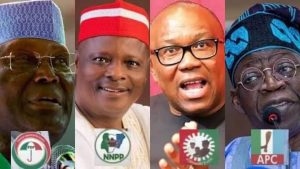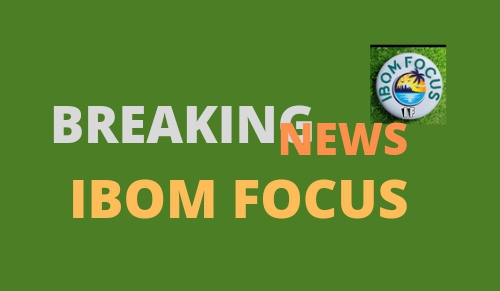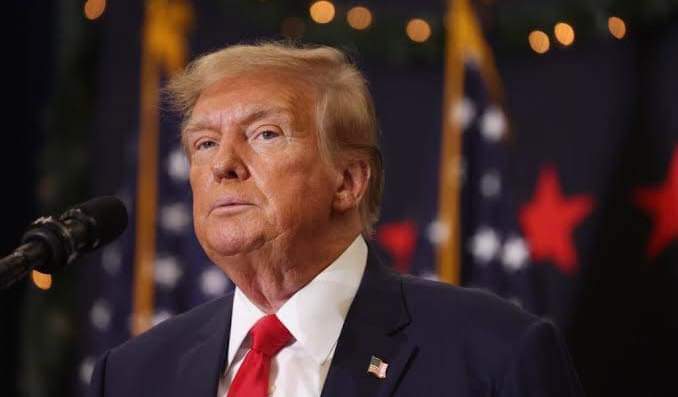
NHRC Releases Poll Survey, Reveals Who Will Win 2023 Presidential Election
NHRC Releases Poll Survey, Reveals Who Will Win 2023 Presidential Election
A new opinion poll conducted by the Nigerian Human Rights Community (NHRC), comprising 134 civil liberty and community-based organisations, has tipped the Presidential Candidate of All Progressives Congress (APC), Asiwaju Bola Ahmed Tinubu, to win the February 25, 2023, Presidential Election.
The coalition made this known on Thursday in Lagos at a press conference addressed by its Secretary-General, Taiwo Adeleye, saying that the APC standard bearer, based on the analysis of the preferences of 19,365 persons that its researchers polled in January, led in four of the most populous states with the highest number of voters in Lagos, Kano, Oyo and Borno.
Adeleye, who addressed the media in the company of Comrade Popoola Ajayi and Taiwo Ajayi, while noting that the APC Presidential Candidate, Tinubu, “holds a magnificent lead and is on course to win the 2023 General Elections,” explained that the polls also confirmed a two-horse race for the second position between the Presidential Candidate of the Peoples Democratic Party (PDP), Alhaji Atiku Abubakar and Mr Peter Obi of the Labour Party (LP), adding that Rabiu Kwankwaso of the New Nigerian Peoples Party (NNPP) came a distant fourth “as all other contestants together scored an insignificant total.”
The activist, however, said the APC standard bearers are sizeable but not unassailable in states like Kebbi, Bauchi, Katsina, Plateau and Rivers whereas as of January 2023, “the largest concentration of undecided voters reside in these states and their is a rising disaffection with the ruling party in the states,” pointing out that these listed states were battlegrounds yet to be conquered.
According to the research, 7,940 (41%) of those interviewed across the 774 local governments in the 36 states of the Federation and Abuja said they preferred the candidate of the APC; 5,035 (26%) indicated PDP’s Atiku Abubakar; 4,067 (21%) supported LP’s Peter Obi; while 1,743 (9%) rooted for NNPP’s Rabiu Kwankwaso. The other parties’ candidates collectively got 1,162 (6%) of the respondents.
Speaking further, Adeleye said the poll results predicted an outright win for Tinubu in 17 states, comprising Lagos, Ogun, Oyo, Osun, Ondo, Ekiti, Cross River, Kwara, Kogi, Nasarawa, Niger, Kaduna, Zamfara, Jigawa, Borno, Yobe and Gombe, while securing 25 per cent of the respondents in 14 other states, including Imo, Ebonyi, Cross River, Edo, Benue, Plateau, Kano, Katsina, Kebbi, Sokoto, Adamawa, Bauchi, and Taraba, making 30 states and the Federal Capital Territory (FCT).

According to Adeleye, the poll projected Tinubu’s closest rival, Atiku, to win seven states, including Adamawa, Taraba, Sokoto, Edo, Akwa Ibom, Bayelsa, and Delta, saying that the respondents gave seven states to Obi also.
He listed the states to include Anambra, Enugu, Imo, Ebonyi, Abia, Benue, and Rivers, saying that the poll favoured Kwankwaso to win only his home state of Kano.
Explaining the methodology adopted in carrying out the research, Adeleye disclosed that the research took six months to conclude, while random sampling was employed, saying that “the questionnaires were in the three major Nigerian languages, Yoruba, Igbo, and Hausa as well as pidgin.”
Adeleye said the group based its deductions on careful consideration of the respondents’ views on religion, ethnicity, party loyalty, and integrity of the candidates, adding that respondents from the North-West, North-East and some North-Central states indicated their willingness to vote based on party loyalty and religion with APC enjoying more party loyalists within a Muslim-dominated population.
NHRC said the Southwestern states were likely to vote based on historical factors that favour the APC presidential candidate, Tinibu, being a former Lagos State governor with a far-reaching network and consistent political activities since 1991, grassroots campaign of the APC, incumbency factor of the APC controlled state governments in the South-West, party loyalty and ethnicity, which will equally favour the APC.
According to the rights group, the Labour Party will enjoy an overwhelming majority in the South-East due to ethnicity and religious sentiment, while states like Plateau in the North-Central might align with these sentiments to register sizeable votes for the Labour Party based on religion.
The group said the study foresaw the PDP maintaining a significant presence in its traditional areas of the South-South and the two North-East states of Adamawa and Taraba while getting significant percentages in most North-West and North-East states.





